Gioachino Greco - Il Calabrese

Gioachino Greco
For him chess was a springboard out of mediocrity. It elevated him from the grim fight to survive to the luxurious surroundings of the Royal Courts of Europe.
He did that as the first commoner to make a big name for himself as a chess player. He was known as Il Calabrese as he was from Calabria in southern Italy. The game brought him fame, wealth and adventure. He achieved a lot in spite of living for just 34 years. He ensured his immortality in the chess world.
Greco's Discovery of Chess

Young Greco stumbled on chess
He may have gone on to have lived a very ordinary life, but something happened. He discovered the game of chess and found that he played it very well.
He was so good that his name quickly spread. A local nobleman, Don Mariano Marano, also a great chess player, was so impressed that he brought young Greco into his household. Marano tutored Greco in the game of chess and eventually Greco was almost his equal.
The Jesuit Era
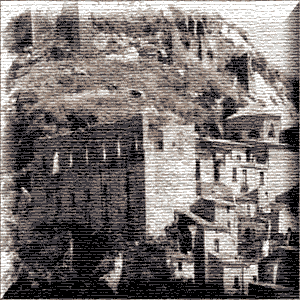
Gioachino Greco attended the Jesuit College in Cosenza
His defense was not perfect but this was typical of the time. Games were always decided by tactical maneuvers culminating in clever mating nets. Not much time was given to study of defensive techniques.
When Greco completed his education he became a professional chess player. He was sponsored not only by Don Marano but other powerful figures like Cardinal Savelli and Francesco Buoncompagni.
He beat one adversary after another and soon his reputation had reached all corners of Italy. Before he knew it he was playing at the Roman Court.
Playing at the Roman Court
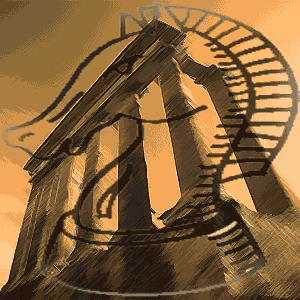
Gioachino Greco reaches Rome
His attacking prowess was probably better than anyone's. Maybe his defense was a little suspect. William Lewis observed: Greco has been justly celebrated as a first-rate player, and his work is considered by good judges as exhibiting great skill and ingenuity, and abounding with brilliant and instructive situations...
...It does not often happen that Greco's method of attacking can be much improved, for in that part of the game he is eminently skillful, but the like praise cannot be given to his system of defense; it must, indeed, be evident that as most of his games are won by brilliant moves, the defense is necessarily imperfect...
Conquering Europe
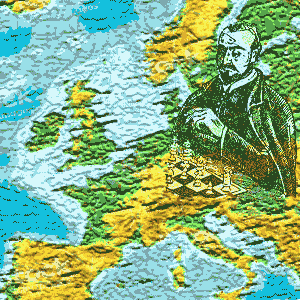
Gioachino Greco traveled throughout Europe beating opponent after opponent
He beat the best players in Paris. He also toured Spain. Everywhere he went, with his reputation preceding him, he met with the most powerful people in these countries, beat the best players and lived the high life. Not bad for a peasant boy from Celico.
He built up contacts in all of these places and had a long line of noble protectors and benefactors. Somewhere along the way he decided to go to England and try his luck there.
Mixed Fortunes in England
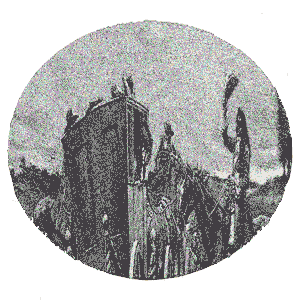
Gioachino Greco is robbed in England
Somewhere on his travels his carriage was intercepted by highwaymen. They were a regular menace on the highways and byways of England. Now it was Greco's turn to make a contribution. They relieved him of 5,000 scudi.
Who's to say who was behind the plot to rob Greco. Maybe the highwaymen were tipped off by some of his vanquished opponents who had lost money to him. Maybe he was just a random victim. Either way he soon had his fill of England and returned to the continent.
Adventures in the New World
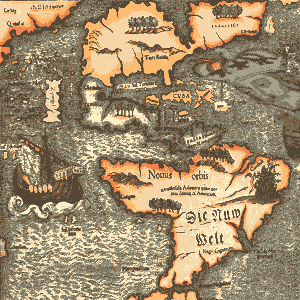
Gioachino Greco sailed to the Caribbean
They eventually landed in the Caribbean. Unfortunately Greco didn't have long to make his mark in the Americas. Like many European settlers he picked up a tropical disease of some sort that he could not recover from.
He passed away in 1634, aged just 34. He left his money and property to the Jesuits who had educated him in his youth. They must have made a good impression on him.
Legacy of Greco
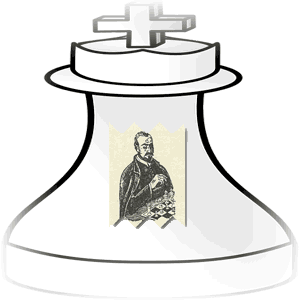
Legacy of Gioachino Greco
He called his main collection Trattato del Nobilissimo Gioco de Scacchi (Treaty of the Noble Game of Chess), which he updated regularly over his career with new games and new ideas.
Some of his work has survived as have quite a few of his games. These were presented as games he played throughout his career, but the opponent's names were never recorded. The opponent in each case is just given as NN (No Name).
It is not known if these were real games or merely compositions but either way they are highly instructive and well worth a look:Greco's games as Black, his handling of the Queen's Gambit, how he played the Italian Game, his approach to the King's Pawn Game and his ideas in the King's Gambit. Yet more of Greco's play in the KPG, play against the Sicilian and rare replies to KPG and finally a couple of his demonstrations of clever traps.
Moving On
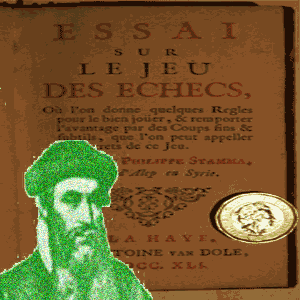
Chess Masters - Philipp Stamma
Chess literature resumes in the middle of the 18th century and not surprisingly improves in depth as time goes on. The first thing to note is that Italy at this point has been replaced by France as the pre-eminent chess nation in Europe.
This no doubt mirrored the political changes in Europe during the 1600s when the Sun King made France the dominant European power. Before we look at the string of great French players we can remember a wonderful chess talent from Syria who made his home in France. He was Philipp Stamma.






